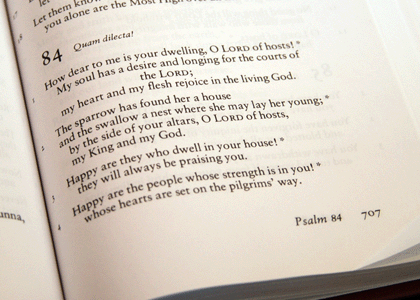Being Present
One of the most profound and meaningful ways to show your love for your spouse is to be fully present. This means giving your spouse your undivided and whole-hearted attention without judgment, without expectation and for the sole purpose of savoring their presence. You probably know exactly what I mean. It happened when you fell in love, when you were content just to see and be in the presence of your beloved regardless of what happened, just so long as you were with them. Everything else faded into the background as you gazed upon, listened to and soaked up the essence of your beloved. That depth of attention was intoxicating and inspiring and likely led to your decision to marry. It gave you and your spouse the emotional ballast necessary to begin a marriage.
What is it about being fully present that is so healing and life-giving? First, God created us to be known fully by both God and our spouses. We have a spiritual gap in our soul that can only find peace once we are in full communion with God and by being fully known by another human being. It started in the Garden of Eden and continues throughout mankind’s history. The pattern of innocence, shame, isolation and the simultaneous desire for being known is very simple. Once you are aware of your sinful limited state, you feel shame. Once you feel shame you feel isolation. Isolation makes you crave the only real solution for being separated from God and others-the solution of being fully known and fully beloved. The only true remedy to shame is to receive the clear-eyed love of another, such as from God or your spouse. Without this response from God or another human being, you will hide in your shame, feel the sting of alienation and get caught in the trap of envy, impression management, anxiety and competition. Our longing to belong, to be known and to be someone’s beloved is who we are. It defines what we need if we are to be well. We need the promise of God’s presence and the promise of the predictable loving presence of our spouse. This is part of what is entailed in the marriage vows when “the love, cherish, and honor” phrase is repeated. We have Jesus’s promise in his last words to his followers before he ascends to heaven in Matthew 28:20, “I am with you always, even unto the end of the world.” We also need to hear and experience a similar promise from our spouse, the promise of their loving presence throughout the marriage.
The problem for many marriages is that as conflict and activities intrude upon the couple, being fully present transforms into being fully distracted. Electronics, chores, work, texts, emails, and hobbies take couples away from being fully present with each other. People also make the mistake of putting off the opportunity to spend time being fully present because they assume that there will be a convenient time in the future. Unfortunately the convenient time never arrives because each day is equally cluttered and distracting.
 These things are not intrinsically bad unless they prevent you from doing the thing that matters most to your spouse, being fully present. For example, when your wife calls you at work, do you stop looking at your emails and text messages while you are on the phone? When you ask your husband how his day went, do you actually listen to the answer or are you multi-tasking? When you go out to dinner, how much time do you spend talking to one another vs. catching up on your smartphone? One of the most frequent complaints I hear in my office is that husbands and wives wish their spouse would put away the smartphone and take off the ear buds. A study conducted on couples at the University of Brigham Young indicated that the most frequent perceived disruption in the relationship was how much time their partner spent interacting with their smartphone! The second most common complaint that I hear is that spouses wish for undivided time alone that is sacred from distractions. Why? They want to be seen, to be heard and to see that their spouse rejoices in their presence. Just as God gives us His loving and full attention, so can you give your loving and full attention to your spouse. We know to seek God’s presence in daily prayer, but we also have to discipline ourselves to seek out our spouse’s daily presence. This makes it much easier for your husband or wife to know deep within that they are beloved, chosen, and accepted regardless of any conflicts or stressors that intrude upon your marriage.
These things are not intrinsically bad unless they prevent you from doing the thing that matters most to your spouse, being fully present. For example, when your wife calls you at work, do you stop looking at your emails and text messages while you are on the phone? When you ask your husband how his day went, do you actually listen to the answer or are you multi-tasking? When you go out to dinner, how much time do you spend talking to one another vs. catching up on your smartphone? One of the most frequent complaints I hear in my office is that husbands and wives wish their spouse would put away the smartphone and take off the ear buds. A study conducted on couples at the University of Brigham Young indicated that the most frequent perceived disruption in the relationship was how much time their partner spent interacting with their smartphone! The second most common complaint that I hear is that spouses wish for undivided time alone that is sacred from distractions. Why? They want to be seen, to be heard and to see that their spouse rejoices in their presence. Just as God gives us His loving and full attention, so can you give your loving and full attention to your spouse. We know to seek God’s presence in daily prayer, but we also have to discipline ourselves to seek out our spouse’s daily presence. This makes it much easier for your husband or wife to know deep within that they are beloved, chosen, and accepted regardless of any conflicts or stressors that intrude upon your marriage.
Here are some helpful tips to help you improve your ability to be fully present:
- Set a time each day to turn off the electronics and pull out the ear buds/headphones when you are with your spouse. Be sure to do this when they are talking. Don’t just act like you are listening-actually try to figure out what they are saying and why. If you just parrot back their words, “What I hear you saying, blah, blah, blah…” you will only infuriate your spouse and up the conflict to positives ratio. Aim to be able to figure out, “What would have to be true in order to make them say this? What do they feel, want or need from me right now instead of a solution?”
- Avoid any attempts to correct your spouse’s diction; phrasing or details of the story-just let them talk. Being the marital speech coach only serves to shut down your spouse and convince them that they are your improvement project vs. their beloved.
- Close your mouth and try not to talk, especially if you are the chatty one. Find out what your spouse has to say when you can give them undivided attention without your comments.
- Slow your breathing; decrease your muscle tension- you know, like you used to do when you felt intoxicated by your spouse’s presence when you fell in love. This will feel good and help to convince your spouse that you are enjoying being in their presence.
- Hold hands, gaze into your spouse’s eyes and forget about conversation. If you like staring at your pet or your baby because it makes you feel good, then try to do the same with your wife or husband-it could feel really good once you remember to do this.
- Set up a routine in which the two of you have time just to be together without having to solve problems, do chores or have any particular task except to bask in one another’s presence. This can be in the morning when you take the time to cuddle before you get out of bed, last thing at night, or any time in between that allows both of you to let go of responsibility and to become mindfully aware of each other in the moment.
Karen Cassiday, Ph.D., A.C.T. is a Light of Christ member with 25 years of experience in clinical psychology. To read her full biography, click here.
Recommended Posts

Summer Services and Fellowship
June 14, 2023

Upcoming Events
February 02, 2022

Upcoming Events
November 23, 2021
